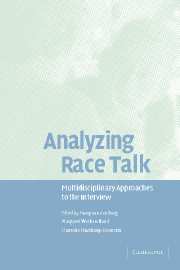Book contents
- Frontmatter
- Contents
- List of contributors
- Preface
- Acknowledgments
- Transcriptions symbols
- Introduction
- 1 Racism and the analysis of cultural resources in interviews
- 2 Analyzing racial discourse: the discursive psychology of mind–world relationships
- 3 Constructivist processes in discourse: a cognitive linguistics perspective
- 4 Institutional, professional, and lifeworld frames in interview talk
- 5 The uses of absurdity
- 6 Multiple voices in talking race: Pakeha reported speech in the discursive construction of the racial other
- 7 Contradictions in interview discourse
- 8 Racism, happiness, and ideology
- 9 The frame analysis of research interviews: social categorization and footing in interview discourse
- 10 Affiliation and detachment in interviewer answer receipts
- 11 Interviewer laughter as an unspecified request for clarification
- 12 Perspectives and frameworks in interviewers' queries
- Appendix: Interview transcripts
- Index
1 - Racism and the analysis of cultural resources in interviews
Published online by Cambridge University Press: 22 September 2009
- Frontmatter
- Contents
- List of contributors
- Preface
- Acknowledgments
- Transcriptions symbols
- Introduction
- 1 Racism and the analysis of cultural resources in interviews
- 2 Analyzing racial discourse: the discursive psychology of mind–world relationships
- 3 Constructivist processes in discourse: a cognitive linguistics perspective
- 4 Institutional, professional, and lifeworld frames in interview talk
- 5 The uses of absurdity
- 6 Multiple voices in talking race: Pakeha reported speech in the discursive construction of the racial other
- 7 Contradictions in interview discourse
- 8 Racism, happiness, and ideology
- 9 The frame analysis of research interviews: social categorization and footing in interview discourse
- 10 Affiliation and detachment in interviewer answer receipts
- 11 Interviewer laughter as an unspecified request for clarification
- 12 Perspectives and frameworks in interviewers' queries
- Appendix: Interview transcripts
- Index
Summary
My goal in this chapter is to illustrate a style of discourse analysis focusing on the cultural resources constituting racist ideological practices. I am interested in the way people tell stories: how they organize their versions of events, and how they build identities for themselves and others as they speak. I am also interested in how powerful majority groups are constructed in discourse, how the members of those groups justify their position, and how they make sense of their history and current actions in relation to their constructions of disadvantaged minority groups. In more general terms, my focus is on what Rosie Braidotti has called “the traffic jam of meanings … which create that form of pollution known as common sense” (1994, 16). Meaning coagulates in a culture and becomes temporarily stuck or jammed. The study of ideological practices involves investigating what these sticking points look like and how they occur, along with the social and political consequences.
As noted in the Introduction, the chapters in this volume have a common focus: transcripts from three interviews that I conducted in the 1980s that form part of a larger corpus of over 80 interviews with white New Zealanders (Wetherell and Potter 1992). As I conducted these interviews, I have a different relationship to the data than the other contributors to this volume, who have come to the re-transcribed interviews fresh.
- Type
- Chapter
- Information
- Analyzing Race TalkMultidisciplinary Perspectives on the Research Interview, pp. 11 - 30Publisher: Cambridge University PressPrint publication year: 2004
- 9
- Cited by



